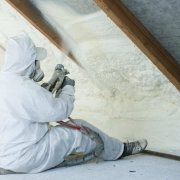
Basement Walls For Spray Foam Insulation:
One of the most crucial rooms in your house to properly insulate is the basement. It frequently has the mustiest odor and most drafts in the entire house. But it’s not necessary to be. Insulation for basements is used to regulate temperature and prevent the growth of mold and mildew.
There are many smelly basements. Even though it’s a widespread issue, it doesn’t have to be that way. Most basements have concrete walls, and concrete is well known for collecting moisture, which is why this is the case. This causes the musty smell that so many of us are familiar with. Make sure you don’t have a more significant moisture intrusion issue before installing insulation. You may need to install a drainage system first if the foundation has any water on a typical day.
Why Insulate Your Basement Using Spray Foam?
Spray foam insulation is a great option for basement insulation since mold and moisture infiltration are prevalent problems in basements.
The benefits of spray foam insulation are countless. Basement walls made of concrete, block, or rock respond extraordinarily well to spray foam insulation with a closed cell. Maintaining closed-cell spray foam insulation is the best option for basement insulation since it has the greatest R-Value, can withstand wet places like basements, and is moisture-resistant.
Getting Ready For Insulation In Your Basement

Preparation is key before beginning any home improvement job. The same is true when using spray foam to insulate your basement. Start by assessing the condition of your basement right now. Keep an eye out for wall cracks, wetness, and other possible problems. The underlying foundation wall surface must be level and free of impediments since the insulation is placed directly to the wall and the strips or studs rest against the insulation. The wall needs to be spotless. Mold and mildew should be eliminated and contained.
If a comprehensive check is required, think about hiring an insulation expert. Things to look for:
- Mold or mildew presence
- Foundational flaws or cracks
- Indications of water damage or leaks
Check For Moisture
Before being insulated, foundation walls must be dry. Tape a 24-inch by 24-inch strip of transparent plastic to the foundation wall at least two weeks before insulating the basement. Cover each of the four sides tightly. The wall is dry enough for eco-friendly spray foam insulation if moisture does not build up between the plastic and the wall.
Reduce Basement Moisture
Water through the wall and groundwater over the top of the wall typically require external correction. Redirecting downspouts, setting up a yard drainage system, sloping the soil away from the wall, constructing French drains, and installing perimeter drain systems at the foot of the wall are typical techniques for preventing dampness.
Clean The Wall’s Mold
Mold develops on the wall as a result of dirt and dust. The effectiveness of the glue or foam that will be sprayed on the wall is decreased by mold development. Scrub the walls with a masonry cleaner to remove the mold.
Select Insulation
When choosing insulation, take into account the insulation’s R-value, which is a gauge of how well it limits heat transfer. Choose a window with an R-value of at least 60 in colder climates. In hotter climates, an R-value of 30 or more is sufficient.
Spray Foam
This material is a fantastic option for insulating basement walls since it offers a vapor barrier and a high R-value, and is simple to cover cables, pipes, and other utilities. Spray foam has the potential to fill in gaps once it has dried, which can aid boost structural stability.
Examine Further Insulating Treatments

Additional coatings can increase fire resistance and aid with moisture protection. Vapor barriers are used with faced insulation to stop moisture from moving between walls. Unfaced insulation lacks vapor barriers, although you might not want one if, for instance, you’re placing over an already-installed layer or if moisture management is not required. Since many forms of insulation generate harmful gases when they catch fire, fire-rated covers are frequently required. If this is required, check the building codes in your area.
Plan Basement Electric Service
The wiring system in the basement must be planned in the following phase. Use the conduit wiring technique if there is no wiring in the basement.
Seal The Wall And Repair Any Damage
Fill holes and cracks with waterproof hydraulic cement using a trowel to repair them. Apply basement waterproofing sealant to the wall as necessary.
Install The Insulation
Then, following the manufacturer’s recommendations, you may start placing your insulation in your basement after it has been properly prepped. Cutting the insulation to fit the dimensions of your walls, ceiling, or floor and attaching it with staples, tape, or other fasteners may be necessary to do this. To protect yourself, you might also need to wear safety equipment like gloves, goggles, or a respirator, depending on the type of insulation you select.
The Basement’s Air Sealing
After installing the insulation in your basement, it’s crucial to air seal it to improve energy efficiency and minimize air leaks. Sealing any openings or holes in your basement’s walls or ceiling can include applying caulk or spray-on insulation. To stop heat loss and make sure that your insulation is as efficient as possible, it’s crucial to air-seal your basement completely.
FAQs
Q1: Is Spray Foam Insulation Suitable For All Climates?
Spray foam components should be kept at a minimum temperature of 60 degrees Fahrenheit, whether they are open-cell or closed-cell. A temperature of at least 40 degrees Fahrenheit should be present for both the substrate and the surrounding air while applying spray foam.
Q2: Can Spray Foam Insulation Help With Soundproofing?
Insulation assists in reducing noise in addition to helping to maintain steady temperatures. A material that encloses the noise source must provide a barrier that absorbs vibrations between the source and nearby locations to limit the transfer of sound from one area to another. Insulation has the ability.
Q3: How Long Does Spray Foam Insulation Last?
Knowing that your investment will last you for years to come and continue to save you money will make you happy. Nevertheless, even if it is discovered to be bad, spray foam is almost hard to remove.
Q4: Can I Install Spray Foam Insulation Myself?
The skilled homeowner might complete these little rooms without paying a contractor’s minimal fee. The kit is available at your neighborhood home improvement store, and you can do the work on your schedule.
Q5: Will Spray Foam Insulation Increase My Property’s Resale Value?
Spray foam insulation increases the value of your house by offering better defense, including against potential water intrusion. Water is more successfully kept out of the house during installation because cracks and crevices are filled.


Leave a Reply
Want to join the discussion?Feel free to contribute!